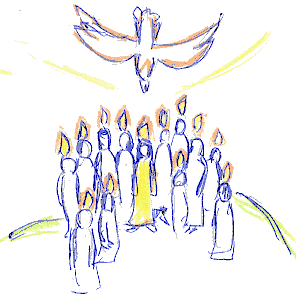 This chapter is subtitled “Can religious experience count as evidence?” and provides an interesting intersection between Ward’s book
This chapter is subtitled “Can religious experience count as evidence?” and provides an interesting intersection between Ward’s book and my own recent one, The Burial of Jesus
. Ward begins his chapter by writing “In most religions, there is an important place for experience. In fact, if there were no distinctively religious experiences, it is doubtful if religions would exist” (p.162).
My own view about Easter (since there has been some confusion about it around the web) is as follows. First, it is fair to say that I am “agnostic” about what happened to Jesus’ body, and that I don’t think it matters, since I doubt most Christians, had Jesus been burned at the stake or had his remains thrown to dogs, would believe that such a death prevents resurrection. It is also my view that religious experiences were what persuaded the early Christians that God had vindicated Jesus beyond the grave, and I am unpersuaded that the earliest experiences contained the tangible element found in later stories (such as those in Luke and John).
It is interesting to note that there is strong evidence that the initial “Easter experiences” (whatever form they took) left the disciples with doubts (see Matthew’s account, for instance) and still fearful. It was a powerful experience of the sort that Christians continue to have today, a “born again experience”, such as Acts 2 describes, that led them to be emboldened and go forth to proclaim their message. There is no doubt that religions mediate transformative experiences. The question is what such experiences prove. In my own case, I’ve felt compelled to acknowledge that my own religious experience cannot be used to prove that a body placed in a tomb almost 2,000 years ago had this or that happen to it.
Science is beginning to examine the neuroscience of religious experience. At one time, I would have found such investigations threatening. But now I realize that, since religious experience is a type of experience, it would make no sense to claim that it has nothing to do with the brain. But the subjective aspect, the qualia of religious experience, is different from a neurological perspective.
 Ward helpfully keeps a balance on the relationship between science and truth. He writes, “science is not the only path to truth, though it is a necessary path to one sort of truth, truth about publicly observable, mathematically measurable, law-like behavior of physical objects” (p.167). If one does not allow for other sorts of “truth” (or whatever one thinks they should be called), then there is a danger: “In its concern to render all respectable knowledge value-free, it removes virtually all historical, political, ethical, aesthetic, personal, legal, and philosophical topics from the area of knowledge and deposits them in the dustbin of personal opinion or even illusion” (p.173).
Ward helpfully keeps a balance on the relationship between science and truth. He writes, “science is not the only path to truth, though it is a necessary path to one sort of truth, truth about publicly observable, mathematically measurable, law-like behavior of physical objects” (p.167). If one does not allow for other sorts of “truth” (or whatever one thinks they should be called), then there is a danger: “In its concern to render all respectable knowledge value-free, it removes virtually all historical, political, ethical, aesthetic, personal, legal, and philosophical topics from the area of knowledge and deposits them in the dustbin of personal opinion or even illusion” (p.173).
Ward has a helpful discussion of the lack of certainty in the domain of historical study (p.178), and the same applies to much or all of the humanities and social sciences, to varying degrees. Ward also helpfully discusses the possibility of a common core of religious experience that may exist in spite of the different interpretations and expressions of it in varied religious and cultural contexts.
Let me conclude with a quotation. “To believe in God is primarily to believe in the objectivity of value and purpose. That view is not based on evidence but is an axiom that makes a life of faith – of seeing all experience in the light of such objective value and purpose – possible…There is no possibility of public verification of religious experiences. But public verification is only possible where there is sensory experience of a common material environment. We cannot publicly verify any statements about feelings, thoughts, motives, and intentions or, in general, any data of personal consciousness. Tests for the authenticity of religious experience lie in consonance with other knowledge, internal coherence, and conformity with the occurrence of similar experiences by others” (p.189).












